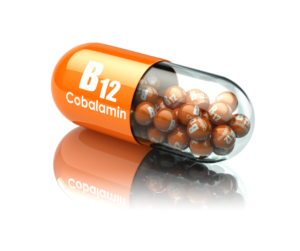What do all these diseases have in common?
- Alzheimer’s disease, dementia, cognitive decline, and memory loss

- Multiple sclerosis (MS) and other neurological disorders
- Mental illness (depression, anxiety, bipolar disorder, psychosis)
- Cardiovascular disease
- Learning or developmental disorders in children
- Autism spectrum disorder
- Autoimmune disease and immune dysregulation
- Cancer
- Male and female infertility
Answer: they can all mimic the signs and symptoms of a vitamin B12 deficiency.
Have you heard about vitamin B12?
I am sure at least once before you have heard about vitamin deficiency; what many don’t know is how vitamin B12 deficiency can impact our lives.
Let’s start by learning a little bit about B12. 
Vitamin B12, or cyanocobalamin, is part of a family of compounds generically called cobalamines. It is a water-soluble vitamin, synthesized exclusively by microorganisms, found in practically all animal tissues and stored primarily in the liver in the form of adenosylcobalamin. The natural source of vitamin B12 in the human diet is restricted to foods of animal origin, especially milk, meat, and eggs (Health Quality Ontario, 2013).
Deficiency of this vitamin can cause hematological disorders, neurological and cardiovascular diseases, and is directly related to hyperhomocysteinemia (HHcy), an independent cardiovascular risk factor and neural damage. In this article, our focus will be on neurological disease due to vitamin B12 deficiency.
The human body absorbs a daily amount of vitamin B12 to stay healthy. Since there are reserves of the vitamin in the liver, it does not have to be ingested every day through food, yet vitamin B12 deficiency is a surprisingly common condition.
How does B12 deficiency occur?
The most common reasons for this imbalance are related to flaws in the vitamin absorption process. Deficiency has a rapid evolution when there are disorders in the gastric and intestinal mucous membranes or when drugs are taken that block their processes (O’leary & Samman).
In other cases, sufficient amounts of vitamin B12 are not consumed for the body’s needs. In certain circumstances, the body processes a higher amount of the vitamin, and in others, enough animal products are not consumed. Even diets that are considered healthy have in many cases a low vitamin B12 content such as vegans and vegetarian diets.
Is there a connection between vitamin B12 and cognitive disorder?
It has been found that patients with low vitamin B12 levels  are at enhanced risk of cerebrovascular disease and cognitive decline. There is a notable connection between poor memory performance by average elderly individuals and those with low vitamin B12 concentration (Malouf & Sastre, 2010).
are at enhanced risk of cerebrovascular disease and cognitive decline. There is a notable connection between poor memory performance by average elderly individuals and those with low vitamin B12 concentration (Malouf & Sastre, 2010).
It has been reported that 15% of people with dementia have a potentially treatable cause, but the prevalence of reversible dementia is only 1% and vitamin B12 deficiency contributes to only 1% of reversible cases (Malouf & Sastre, 2010).
Vitamin B12 is extremely important for the protection of nerve cells. Low vitamin B12 often manifests itself in nervous system problems, for example, in the demyelination of nerves in the spinal cord. Symptoms are usually: nervousness, irritability, fatigue, neurological problems, depression.
How can I keep an ideal B12 level?
The normal range for vitamin B12 in the blood is between 200 and 900 nanograms per millilitre (ng/mL). One way to keep the ideal B12 levels is through diet. The natural source of vitamin B12 in the human diet is restricted to foods of animal origin, especially milk, meat, and eggs (Paniz, 2005). This means that we only can find vitamin B12 in animal products.
I’m vegetarian/vegan, what should I do?
Don’t panic! If you have a restriction diet, talk with your doctor and check your B12 levels. You may benefit from starting an artificial supplementation or looking for fortified foods such as plant milk.
Notes:
Which vegetarians need supplementation?
- Pregnant women (indisputable)
- Women breastfeeding (indisputable)
- Children (indisputable)
- Vegans
- Vegetarians who use eggs and dairy products, but irregularly, as in this case they may not reach the recommended daily requirement.
Adults (out of gestation and breastfeeding) may choose not to use supplementation as long as they have laboratory follow-up.
The US Institute of Medicine (Food and Nutrition Board) recommends B12 supplementation in all individuals (whether they eat meat or not) over 50 years of age, as 10 to 30% of them have difficulty extracting vitamin D food.
Regarding pregnant women, breastfeeding women and children, the use of eggs and milk may offer enough vitamin B12. Its use must be daily and the amount adequate to meet the daily need. As vitamin B12 has no toxic effects, even at high doses, it is prudent to use fortified foods and/or supplements.
Author: Diana Dias – Nurse at the University of the Sapucai Valley, Brazil, certified as a Specialist in preventative and natural health
REFERENCES
Health Quality Ontario. Vitamin B12 and cognitive function: an evidence-based analysis. Ont Health Tech Assess Ser [Internet]. 2013 November;13(23):1–45.
MALOUF, R.; SASTRE, A.A.. Vitamin B12 for cognition. Cochrane dementia and cognitive Improvement group. 2010.
O’LEARY, F.; SAMMAN, S.. Vitamin B12 in health and disease. University of Sydney, Nutrients: 2006.
PANIZ, C. et al. Pathophysiology of vitamin B12 deficiency and its laboratory diagnosis • J Bras Patol Med Lab • v. 41 • n. 5 • p. 323-34, 2005.
Position of the American Dietetic Association and Dietitians of Canadá: Vegetarian diets. J Am Diet Assoc. 2003;103:748-765.
